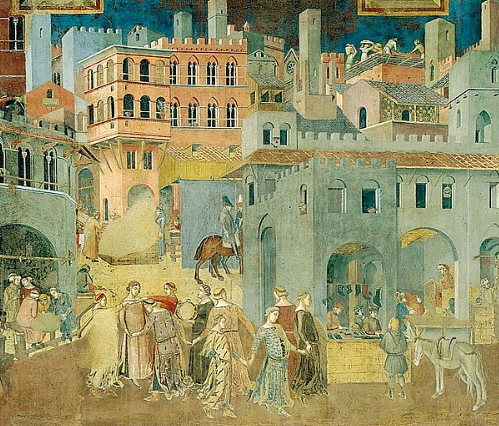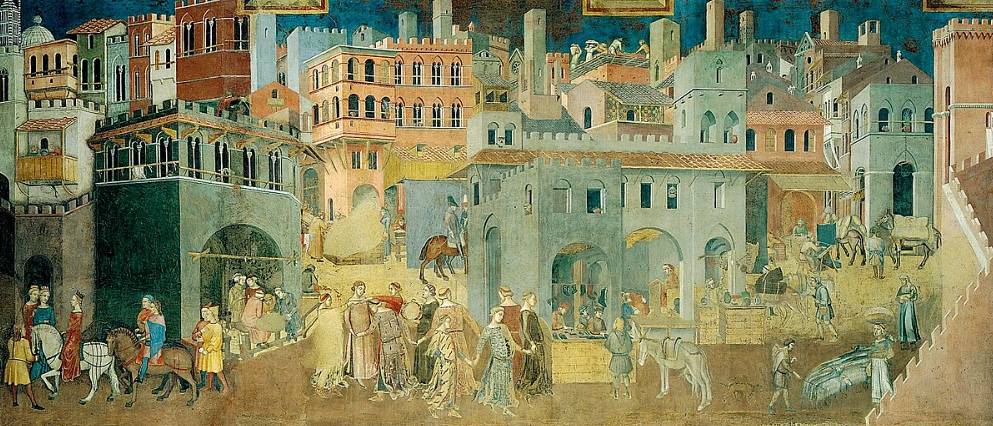Explore the Life and Times of Mediaeval City Women
- A Modern Symposium at Mediaeval Prices
- Saturday, April 5, 2025
- Registration: 8:30 am | Symposium: 9:00 am – 4:30 pm
- Alumni Hall, Room 400, 121 St. Joseph St., Toronto
- $150.00 Includes lunch & coffee/tea
- Registration closes March 28 – register now to avoid disappointment.
Overview
The great mediaeval French writer, Christine de Pisan, wrote about The City of Ladies, an idyllic community of great women of the past. Real mediaeval cities and their women, however, diverged significantly from Christine’s ideal.
Mediaeval cities were lively and complex environments. They were filled with people: rich, poor, and middle class all living in close quarters. They were places of opportunity and danger. People flooded to cities to establish businesses, to find a new start in life, to leave their past behind, or to hide from the law. They were also replete with cut-purses and cut-throats, rogues and rapists. Women were very much a part of city life: apprentices and servants, noble ladies and ladies of the night, wives and widows, nurses and nuns, all lived within the walls of mediaeval cities. We shall explore the real cities in which women lived and worked by exploring life and culture in various cities across mediaeval Europe.
Hosted by Jacqueline Murray, University Professor Emerita, University of Guelph and Fellow, St Michael’s College
Sessions & Speakers
8:30-9:00 Registration and morning coffee
9:00-9:10 Welcome, Jacqueline Murray, Host and Convenor, University of St Michael’s College & Mediaeval Studies, University of Toronto & History, University of Guelph
9:10-10:00 Sisters of Beaune: Caring for the Sick in the Late Middle Ages, Isabelle Cochelin, History & Mediaeval Studies, University of Toronto
Abstract: We often imagine that mediaeval women were forced to choose between marriage and the cloister. There were, however, multiple other options which scholars have only started to explore. One example is the sisters working in hospitals, such as those at the hospice of Beaune. Founded in 1443, by Nicolas Rolin and Guigone de Salins, a lay couple, who even wrote a rule to structure the sisters’ daily life. What do we know about these women who played a key role within late mediaeval society? How did their life differ from that of nuns, whose governing norms were usually written by churchmen)?
10:00- 10:30 Coffee Break
10:30-11:30 From Merchants to Servants: A Consideration of Women in Sixteenth- and Seventeen-Century Scotland, Cathryn Spence, History & Centre for Scottish Studies, University of Guelph
Abstract: In late mediaeval and early modern Scottish towns, women occupied a variety of economic positions. They were merchants, moneylenders, and servants and they forged and maintained relationships across social classes. Using Edinburgh as a case study, we will investigate the economic, social, and religious connections that affected their lives, including where they lived, which parts of the city they went to, their daily tasks, and their subsequent impact on their city.
11:30-12:30pm Constança of Girona: Conversion and Agency in Late Mediaeval Catalonia, Alexandra Guerson, New College, University of Toronto, and Dana Wessell Lightfoot, History, University of Northern British Columbia
Abstract: In the Summer of 1391, Jewish communities throughout the Kingdom of Castile and the Crown of Aragon were attacked by mobs and often faced the choice of death or conversion. In the Catalan city of Girona, a young Jewish woman named Bellaure converted to Christianity, taking the name of Constança, sparking a conflict with her Jewish husband. We will trace Constança’s story over three decades as she divorced, remarried, managed property, loaned and borrowed money, becoming one of the most active women connected to the Jewish community of Girona during a pivotal time. Throughout this period, she successfully cultivated ties with both Jews and Christians, navigating such relationships despite increasing conflict.
12:30-2:00 Mediaeval Lunch (Fr Madden Hall in Carr Hall, just across St Joseph’s St)
2:00-3:00 Rhyme by Rhyme: Women and Men in Poetic Dialogue, Konrad Eisenbichler, Victoria College, University of Toronto
Abstract: In the late summer of 1540, there was an exchange of sonnets between a group of noble women in Siena and Alessandro Piccolomini, at that time a student at the University of Padua. This exchange illustrates the level of linguistic and poetic competence among women who were not, by any means, professionally engaged with the world of letters or with poetic composition. The women responded per le rime, that is, by re-using Piccolomini’s rhyme scheme and even his rhyme words. This exchange of poetry identifies a network of women writers who knew each other personally and were aware of each other’s participation in this particular poetic venture.
3:00-4:00 Geoffrey Chaucer, Cecily Chaumpaigne, and Female Labour, Sebastian Sobecki, English & Mediaeval Studies, University of Toronto
Abstract: Geoffrey Chaucer is the most famous poet of the later Middle Ages. While The Canterbury Tales are widely familiar, less is known about Chaucer’s life in London, and a court case that surrounded Chaucer and a servant woman, Cecily Chaumpaigne. This case raises questions about what we know (and don’t know) about her relationship with Chaucer. This paper will summarise what we know about the relationship between Chaucer and his servant Cecily Chaumpaigne and will introduce new findings that have implications for our understanding of female labour in late-mediaeval London.
4:00-4:30 General Discussion & Concluding Remarks
Questions?
Registration is now closed. Thank you.
Subscribe to Our Mailing List
Please sign up for the latest news about our courses, programs, workshops, special lectures, and more.



